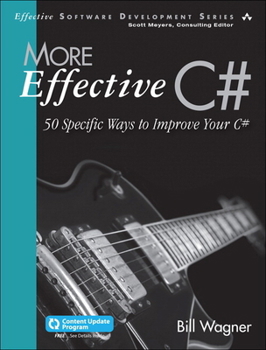More Effective C#: 50 Specific Ways to Improve Your C#
(Part of the Effective Software Development Series)
Select Format
Select Condition 
Book Overview
In More Effective C#, Second Edition, world-renowned .NET expert Bill Wagner identifies and illuminates 50 intermediate-to-advanced techniques for writing exceptionally robust and well-performing C# 7.0 code. Reflecting the growing sophistication of the C# language and its development community, Wagner presents powerful new solutions to problems you're likely to encounter every day.
Through three editions of Effective C#, Wagner's clear explanations, expert tips, and realistic code examples have proven invaluable to hundreds of thousands of developers. With the publication of this title, Effective C#, Third Edition, and More Effective C#, Second Edition, have been completely reorganized to provide clear explanations, expert tips, and realistic code examples in a cohesive package for modern C#. More Effective C#, Second Edition, brings the same proven approach to the new features in C# 7.0, helping you perform familiar tasks more efficiently and effectively.
Drawing on his unsurpassed C# experience and key role on global C# standards committees, Wagner addresses object-oriented, functional, and service-oriented approaches to managing data with C#; better ways to express your intent to users and other programmers; and new opportunities to leverage powerful asynchronous and dynamic programming techniques.
You're already a successful C# programmer: this book will make you an outstanding one.
Content Update Program: This title is no longer part of the Content Update Program. The content is final, and no further updates will be released.












